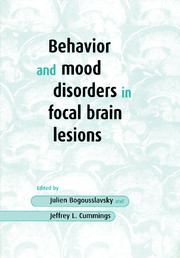Book contents
- Frontmatter
- Dedication
- Contents
- List of contributors
- Preface
- Acknowledgments
- 1 Emotional consequences of focal brain lesions: an overview
- 2 The evaluation of mood and behavior in patients with focal brain lesions
- 3 Methodological issues in studying secondary mood disorders
- 4 Emotional behavior in acute brain lesions
- 5 Depression and lesion location in stroke
- 6 Mood and behavior in disorders of the basal ganglia
- 7 Mania and manic-like disorders
- 8 Behavioral and emotional changes after focal frontal lobe damage
- 9 Disorders of motivation
- 10 Thalamic behavioral syndromes
- 11 Obsessive-compulsive disorders in association with focal brain lesions
- 12 Emotional dysprosody and similar dysfunctions
- 13 Temporal lobe behavioral syndromes
- 14 Neural correlates of violent behavior
- 15 Focal lesions and psychosis
- 16 Alterations in sexual behavior following focal brain injury
- 17 Anosognosia
- 18 Acute confusional states and delirium
- Index
16 - Alterations in sexual behavior following focal brain injury
Published online by Cambridge University Press: 05 August 2016
- Frontmatter
- Dedication
- Contents
- List of contributors
- Preface
- Acknowledgments
- 1 Emotional consequences of focal brain lesions: an overview
- 2 The evaluation of mood and behavior in patients with focal brain lesions
- 3 Methodological issues in studying secondary mood disorders
- 4 Emotional behavior in acute brain lesions
- 5 Depression and lesion location in stroke
- 6 Mood and behavior in disorders of the basal ganglia
- 7 Mania and manic-like disorders
- 8 Behavioral and emotional changes after focal frontal lobe damage
- 9 Disorders of motivation
- 10 Thalamic behavioral syndromes
- 11 Obsessive-compulsive disorders in association with focal brain lesions
- 12 Emotional dysprosody and similar dysfunctions
- 13 Temporal lobe behavioral syndromes
- 14 Neural correlates of violent behavior
- 15 Focal lesions and psychosis
- 16 Alterations in sexual behavior following focal brain injury
- 17 Anosognosia
- 18 Acute confusional states and delirium
- Index
Summary
Introduction
The brain is the source of the motivating impulse, processor of the preparatory stimuli, and organizer of the required motoric activity for sexual activity. The motivating impulse, or libido, is the source of the behaviors of courting and romance. The notions of beauty and sense of family also arise from the brain. Lesions of the nervous system can derange this set of behaviors in many ways. A variety of alterations in sexual behavior in association with neurological disease have been observed and reported. An analysis of this literature is of interest, not only because of its obvious clinical importance, but also as a means of studying the neurological basis of such behavior. Sexual activity is the result of a complex interaction of diverse influences, namely psychosocial, developmental, hormonal, and neurological. It is therefore subject to perturbation in many ways. An understanding of this interplay has far-reaching implications not only for the individual but also for the human species at large. This chapter reviews the literature on focal neurological lesions affecting sexual behavior and draws inferences on the neuroanatomy subserving such behavior. Finally, it addresses therapies aimed at modifying sexual function in the neurologically impaired.
Background and definitions
Despite many case reports and exhaustive animal research there are still many unanswered questions about the neurological basis for the human sexual response. It has proven to be a very difficult topic to study for a number of reasons. First, patients are not always forthcoming with observations or complaints regarding their sexuality. This may be because of self-consciousness, denial, or a lack of confidence in their physician's ability to deal with such issues. Second, most physicians themselves do not specifically ask questions regarding patients’ sexual behavior. This may be secondary to discomfort in discussing these issues or because physicians underestimate their importance. In comparison to, for example, the ability to ambulate, sexual impairment may seem a secondary concern, but sexual dysfunction can be a major cause of distress and can affect quality of life dramatically. It is sometimes unclear with whom the appropriate expertise lies, whether in the realm of the urologist, gynecologist, endocrinologist, neurologist, psychologist, or psychiatrist. Third, the multifactorial nature of sexuality makes it difficult to analyze. The influences of unmeasurable factors such as family and religious values, past experiences, and partner availability make controlled observations impossible.
- Type
- Chapter
- Information
- Behavior and Mood Disorders in Focal Brain Lesions , pp. 437 - 464Publisher: Cambridge University PressPrint publication year: 2000



